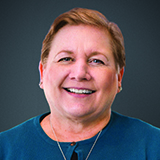It doesn’t matter if you are new at navigation or a seasoned navigator, we each need to invest in our careers. In order to move up the ladder within your current organization, or apply for a promotional position at another institution, we need to demonstrate our commitment to constantly learning new information. Currently, many navigators need to justify their own existence in the position they have, despite the Commission on Cancer standards targeted at requiring that there be a navigation program within the infrastructure of where patients are receiving their cancer diagnosis and treatment.
Why bring this up now as an important topic? Because if you work within a hospital or university health system, it is more than likely you are experiencing a continuation of budget cuts, the first of which are usually targeted at the line item associated with monies for continued staff education. Does that mean you no longer attend conferences or get journal subscriptions or go to other CEU-accredited seminars associated with educating you more about community outreach, navigation, and survivorship? I sure hope not. It is very important that we all remain abreast of what is happening in our field. So how can you get the education you need? By making a personal investment—as hard as that may seem, it is the smart thing to do. If you are a registered nurse, you probably don’t expect your hospital to pay for your nursing license renewal, right? That is your responsibility. Well, budget cuts that remove funding opportunities for continuing education are now falling into that same category; it is the employee’s responsibility.
Think about it. If there was an easier way to perform a specific navigation task or function, wouldn’t you want to learn about it and make your life a little easier? For those who are the only navigator within their clinical practice, just the concept and opportunity to network with others is a blessing unto itself. And if I were interviewing you for a navigator position and I knew that one candidate had not attended any continuing education programs in the past 2 years while another had paid out of pocket to get to the AONN+ Conference so she could remain up to date on the latest information about navigation, which person do you think I would rank higher for my interview evaluation? That’s right, the one who demonstrated a personal commitment to wanting to further her education, despite it now being an out-of-pocket expense.
Some take-home messages:
- When creating your personal budget, factor in dollars for continuing education. It’s important.
- Those who do invest in their own career growth are the ones who get the higher salaries and better positions because managers recognize this as a quality they want to foster within their organization.
- Be sure to keep all receipts and record your mileage, as this type of career education is a business expense and, therefore, can usually be included in your annual tax record submissions (include mileage, airport parking, airline fee, hotel fee, food expenses, mileage to and from the airport, registration fee for the conference).
- If you can combine the conference with a family vacation immediately prior to the conference or right after it is completed, you are creating efficiency and value for your dollars being stretched to go even further than perhaps originally planned.
- Be sure to record the conferences, seminars, webinars, educational dinners, etc, you have attended in a continuing education document and maintain this as a running log. Reference those that you flipped the bill to attend. Provide this document as an addendum to your CV.
- Be sure to complete your evaluation forms after attending an educational program so that the presenters get the feedback they need to make sure they have addressed your expectations as well as improve the content for a future presentation.
- If there are special topics of interest that you want AONN+ to focus on that are not being addressed, make our AONN+ leadership team aware so they can be considered for a future educational venue.
- Finally, invest in yourself. You are worth it!
With kind regards,
Lillie D. Shockney, RN, BS, MAS
Editor-in-Chief





